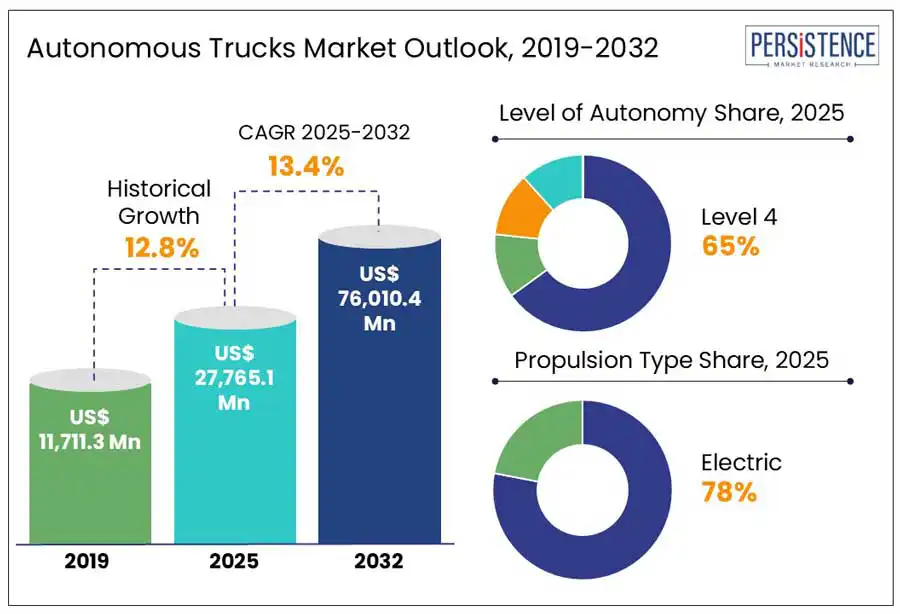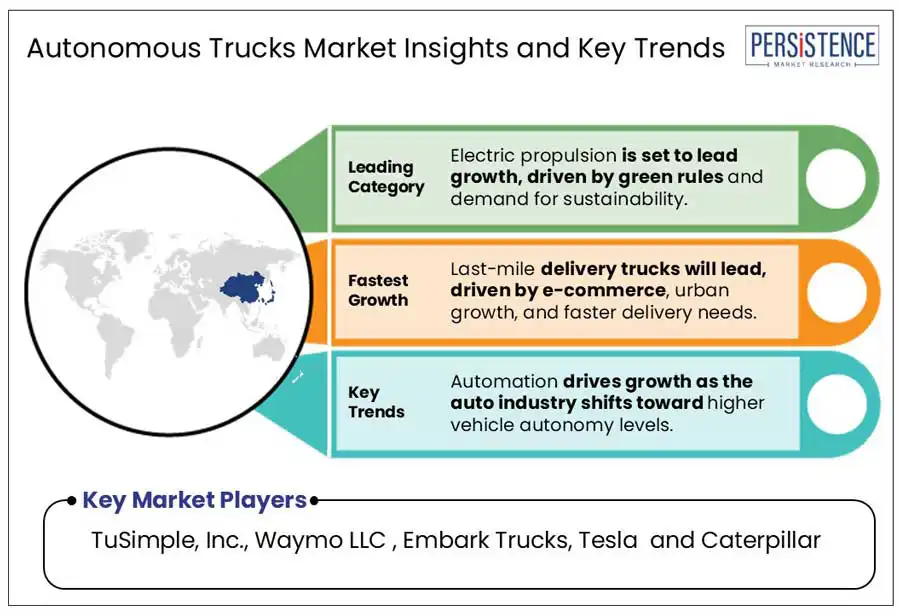ID: PMRREP35296| 200 Pages | 9 May 2025 | Format: PDF, Excel, PPT* | Automotive & Transportation

The global autonomous trucks market size is poised to grow from US$ 27,765.1 Mn in 2025 to US$ 76,010.4 Mn at a whopping CAGR of 13.4% by 2032. According to the Persistence Market Research report, autonomous trucks are commercial vehicles with advanced technologies such as artificial intelligence (AI), LiDAR, sensors, and optical cameras that enable automated driving with minimal or no human input. These vehicles independently perform key driving functions, such as acceleration, braking, steering, and navigation tasks. As a result, autonomous trucks have the potential to transform transportation and logistics industry, and enhancing efficiency, improving safety, lowering operational costs.
Recent advancements in sensor technology and real-time data processing have allowed manufacturers to integrate different levels of autonomy into their truck models. These self-driving trucks can reduce accidents and fatalities, improve fleet utilization by minimizing downtime, and significantly cut labor costs for logistics operators.

|
Global Market Attribute |
Key Insights |
|
Autonomous Trucks Market Size (2025E) |
US$ 27,765.1 Mn |
|
Market Value Forecast (2032F) |
US$ 76,010.4 Mn |
|
Projected Growth (CAGR 2025 to 2032) |
13.4% |
|
Historical Market Growth (CAGR 2019 to 2024) |
8.4% |
Automation is emerging as a significant driver in the autonomous trucks market, as the global automotive industry shifts toward higher levels of vehicle autonomy. The adoption of self-driving technologies such as adaptive cruise control, lane-keeping assistance, and automatic emergency braking enhances safety, operational efficiency, and paves the way for fully autonomous logistics solutions. These advanced driver assistance systems (ADAS) are integral to enabling trucks to navigate safely, respond to dynamic environments, and reduce the dependency on human drivers.
Collaborations between Original Equipment Manufacturers (OEMs) and Tier 1 suppliers are also intensifying to streamline the integration of ADAS and autonomous systems. For instance, Magna International (Canada) and Robert Bosch GmbH (Germany) are actively developing cutting-edge ADAS solutions. Magna recently launched its ClearView vision system on the Ram 2500 and 3500 heavy-duty trucks, offering enhanced parking and maneuvering capabilities. These strategic efforts and technological advancements continue to fuel momentum in the autonomous truck industry, making automation a cornerstone of future growth.
The absence of adequate infrastructure is a significant barrier to the broad use of autonomous trucks. While advanced driver-assistance systems (ADAS) and self-driving technologies offer great potential for improving safety and efficiency, their success depends heavily on complementary infrastructure, particularly robust communication networks and well-maintained road systems.
Autonomous trucks require essential infrastructure such as clearly marked roads, lane markers, and reliable GPS connectivity to function optimally. Efficient vehicle-to-vehicle (V2V) and vehicle-to-infrastructure (V2X) communication systems are crucial for the smooth operation of autonomous trucks, providing real-time information such as lane changes, object detection, traffic updates, and navigation services.
The rapid development of smart infrastructure and the global rollout of 5G networks is creating a fertile environment for the widespread adoption of autonomous trucks. 5G technology offers ultra-low latency, high-speed data transmission, and massive network capacity key enablers for real-time decision-making and communication in autonomous driving systems. These advancements facilitate seamless vehicle-to-vehicle (V2V), vehicle-to-infrastructure (V2I), and vehicle-to-everything (V2X) communication, essential for safe and efficient autonomous truck operations.
Smart roads embedded with sensors, intelligent traffic signals, connected freight corridors, and high-precision GPS systems are already being developed in countries like the U.S., China, and Germany. These upgrades improve traffic flow, reduce accidents, and enhance route optimization for autonomous fleets. For example, Germany’s Autobahn has smart lanes under development specifically for autonomous freight corridors.
Volvo Autonomous Solutions has partnered with telecom firms to test autonomous trucks over 5G networks for mining and port logistics. Similarly, TuSimple and Navistar have collaborated on deploying self-driving trucks supported by smart infrastructure in the U.S. Additionally, Hyundai is investing in smart mobility hubs integrated with 5G infrastructure to facilitate autonomous vehicle testing and deployment.
Electric propulsion is poised to play a crucial role in driving high demand for autonomous trucks, particularly as the transportation industry shifts toward cleaner, more sustainable solutions. As concerns over carbon emissions, fuel costs, and environmental regulations intensify, electric autonomous trucks offer a compelling solution with zero tailpipe emissions, lower operating costs, and compatibility with advanced driving technologies.
Electric trucks are particularly well-suited for autonomous operations due to their simpler mechanical systems, which reduce maintenance needs and improve system integration with autonomous driving components such as LiDAR, sensors, and AI-driven software. Additionally, electric powertrains provide smoother acceleration and braking, ideal for the precision needed for autonomous navigation.
Key manufacturers are accelerating developments in this space. Tesla, for instance, is advancing its Tesla Semi, which combines electric propulsion with autonomous capabilities. Similarly, Volvo Autonomous Solutions is partnering with Aurora to develop electric, self-driving trucks for logistics and freight operations. Einride, a Swedish startup, has already launched autonomous electric pods for commercial freight, showcasing the real-world viability of the concept.
The rapid expansion of e-commerce has sharply increased the need for efficient and dependable last-mile delivery solutions. Last-mile delivery trucks are essential in this process, transporting goods from distribution hubs directly to consumers. To meet growing demand and rising delivery expectations, the logistics industry is turning to autonomous trucks. These vehicles can operate continuously without fatigue, helping reduce labor costs and improve delivery speed and reliability.
Autonomous trucks are becoming increasingly popular due to their ability to meet the logistical demands of the booming e-commerce sector. Their primary advantages include timely deliveries and significant cost savings for companies. In the United States, substantial efforts are underway to develop advanced ground-based and drone delivery technologies, aimed at optimizing last-mile logistics in both urban and rural settings.
To enhance safety and operational efficiency, companies are making significant investments in cutting-edge technologies such as advanced sensor suites, machine learning algorithms, and real-time data processing systems. These innovations are paving the way for a more scalable and intelligent last-mile delivery network, allowing businesses to handle higher volumes of packages with improved precision and reduced human intervention.

Europe's well-established automotive sector is a key driver for the growth of the autonomous trucks market. As of September 2024, the region hosts 255 automobile assembly and production plants, with 98 dedicated to cars, 44 dedicated to buses and 32 to trucks. This strong manufacturing base supports innovation and scalability in autonomous vehicle production.
Despite global automotive challenges, Europe has shown steady growth in recent years. In January 2024, the European Union's new vehicle registrations surged by 12.1% year-on-year, reaching 851,690 units, marking a strong rebound after a brief slowdown in December 2023. This growth reflects the region's resilience and capacity to adopt advanced technologies.
European automotive giants such as Volvo, Daimler Truck AG, and MAN Truck & Bus are investing heavily in autonomous technologies. These manufacturers are incorporating high-performance engines, cutting-edge driver assistance systems, and robust safety features to stay competitive.
North America is projected to maintain a strong position in the autonomous trucks market throughout the forecast period, driven by a dynamic ecosystem of established players and innovative startups. The region is home to several key companies accelerating the deployment of autonomous trucks, particularly for freight and logistics operations.
Startups such as Embark Trucks, Aurora Innovation, and Waymo Via are leading the charge in advancing autonomous technologies. For instance, in April 2023, Aurora announced plans to launch a self-driving trucking service between Dallas and Houston, testing autonomous freight-hauling on one of the busiest commercial corridors in the U.S. These pilot programs demonstrate the region’s readiness to adopt autonomous solutions at scale.
Major manufacturers such as PACCAR, Tesla, and Volvo North America are heavily investing in autonomous systems, incorporating advanced AI algorithms, LiDAR sensors, and real-time connectivity to enable autonomous navigation and highway driving.
Asia Pacific is expected to witness the leading CAGR in the autonomous trucks market during the forecast period, driven by the implementation of stringent road safety regulations and the rapid advancement of autonomous vehicle technologies, particularly in China and Japan. The region is becoming a hotbed for innovation, especially in the areas of last-mile delivery and mining operations, where autonomous trucks offer significant efficiency and cost benefits.
Governments across China, Japan, South Korea, and Singapore are investing heavily in R&D for autonomous vehicle ecosystems. In China, autonomous driving has been classified as a strategic priority, with government policies and funding actively supporting its development. The Chinese government has set ambitious targets to become a global leader in autonomous technology.
TuSimple, a pioneer in autonomous freight solutions, operates extensive trials and partnerships across China and the U.S. Pony.ai, another leader, has been developing autonomous logistics systems with multiple OEMs. FAW Group, one of China's largest state-owned vehicle manufacturers is investing in smart logistics and autonomous truck platforms, pushing for commercial deployment in industrial and port zones.
The global autonomous trucks market is highly competitive, with established industry giants and emerging tech startups vying for market share based on innovation, autonomy levels, energy efficiency, and integration with AI and IoT technologies. The key players are focusing heavily on R&D and strategic partnerships to enhance vehicle safety, navigation precision, and overall system reliability, offering greater value to logistics operators and fleet owners.
The growing demand for driverless logistics solutions has spurred significant advances in sensor fusion, machine learning, real-time data analytics, and vehicle-to-infrastructure (V2I) communication systems. Companies pioneering these technologies gain a competitive advantage by improving operational safety, efficiency, and cost-effectiveness, particularly in the last-mile delivery and long-haul freight applications.
New entrants, including both mobility startups and software-driven autonomous vehicle firms, are disrupting traditional trucking models. These companies focus on securing venture capital, forming alliances with logistics providers, and running pilot programs in geofenced environments. Startups like Aurora, TuSimple, and Embark are quickly gaining momentum through innovation and partnerships.
The Autonomous Trucks market is estimated to be valued at US$ 27,765.1 Mn in 2025.
Rising demand for efficient logistics and last-mile delivery, and advancements in AI, sensors, and connectivity technologies are the major growth drivers.
The industry is estimated to rise at a CAGR of 13.4% through 2032.
Growth of truck platooning systems, and autonomous trucks in industrial & mining operations are key market opportunities.
The global autonomous trucks market is dominated by major players such as TuSimple, Inc., Waymo LLC , Embark Trucks, Tesla and Caterpillar.
|
Report Attribute |
Details |
|
Historical Data/Actuals |
2019 - 2024 |
|
Forecast Period |
2025 - 2032 |
|
Market Analysis Units |
Value: US$ Mn, Volume: Units |
|
Geographical Coverage |
|
|
Segmental Coverage |
|
|
Competitive Analysis |
|
|
Report Highlights |
|
|
Customization and Pricing |
Available upon request |
By Propulsion Type
By Level of Autonomy
By Truck Type
By Application
By Region
Delivery Timelines
For more information on this report and its delivery timelines please get in touch with our sales team.
About Author